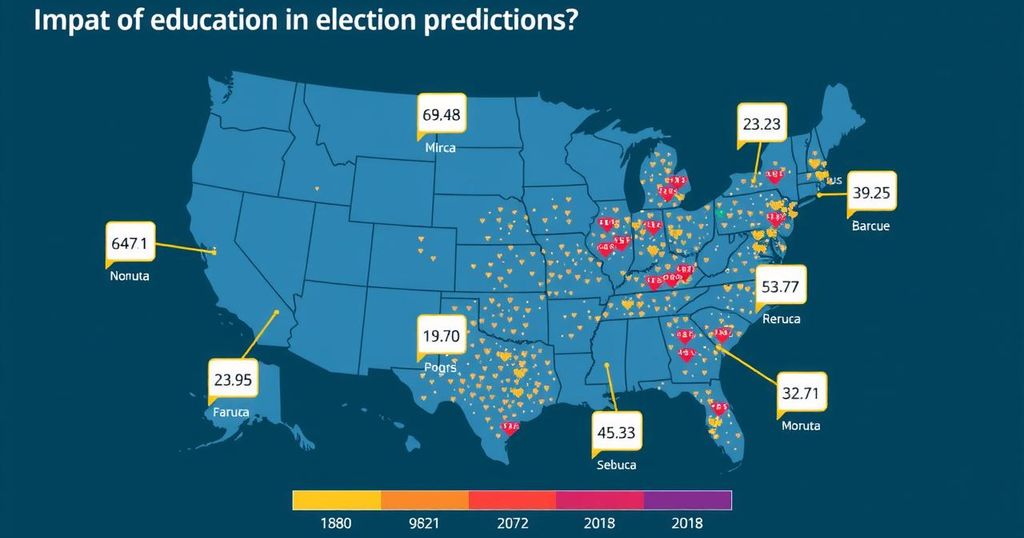Bridging the Gap: Education, Economic Insecurity, and the Coming Election

The ratification of a union contract by Brass Jar Productions, regulating drinking on the job in its Drunk Shakespeare performances, reflects society’s shifting views on entertainment. This phenomenon parallels discrepancies in education preferences, where stated satisfaction belies increased enrollment in alternatives like charter schools and community colleges. As the presidential election approaches, the division between education and voter behavior suggests that economic insecurity may lead to risk-averse choices, heavily informing electoral outcomes. The outcome hinges on voter knowledge and engagement with the issues at stake.
In recent developments within the labor market, Brass Jar Productions, the company behind Drunk Shakespeare, has ratified an unprecedented union contract that regulates drinking on the job. This innovative contract, according to the union, ensures that actors receive health benefits and sick leave—elements deemed essential for the workforce. The company expressed its enthusiasm in garnering the Actors’ Equity Association’s approval, asserting its commitment to delivering unique and spirited performances. Drunk Shakespeare, which features one intoxicated actor attempting to perform classic plays while supported by sober counterparts, has gained accidental popularity, leading to similar productions like Drunk History and seasonal performances such as Drunk Dracula. This raises questions about the dichotomy between what audiences claim to prefer and what they actually enjoy. Concurrently, discussions surrounding education and workforce development reveal a significant gap between stated and revealed preferences. Julie Stone, Director of Family Economic Mobility at Colorado’s Gary Community Ventures, emphasized the paradox in public surveys regarding the satisfaction with public education, juxtaposed with the burgeoning demand for alternatives like charter schools and Education Savings Accounts (ESAs). Despite over 70 percent of parents expressing satisfaction with public schools, millions are opting for charter or private education, demonstrating a stark departure from their declared preferences. The disparity extends into higher education, as recent trends show a decline in community college enrollments despite robust support for public funding. Economic insecurity and fears of a challenging job market exacerbate this gap, leading parents to guide their children towards degrees perceived as more secure when it comes to favorable employment outcomes. Urban higher education institutions are faring better than rural counterparts, indicating a shift towards areas with better job prospects. As the upcoming presidential election approaches and polling suggests a deadlock, analysts are exploring how education—particularly the gap between what voters say they want and what they choose—may forecast election outcomes. Historical data point to a tendency for voters to prioritize personal benefit over pro-social policies, indicating that amid economic distress, risk aversion may guide their choices. The current election landscape showcases former President Trump as a familiar figure amid economic turbulence, which could lead voters to perceive him as a safer option compared to the largely less known Vice President Harris. This scenario posits that voters might lean toward the known quantity of Trump, despite concerns regarding his impulsive decision-making. While this may subvert traditional voting behaviors linked to educational attainment, the resolution of this electoral question hinges on the voters’ ability to assess risk and make informed decisions. If voters are inadequately informed or disillusioned by the educational system to discern safe choices reliably, it may perpetuate a cycle of under-informed decision-making that hinders effective electoral outcomes. This highlights the necessity of both education and informed engagement in the democratic process. Lastly, it is critical to recognize the potential consequences of intoxicated voting, reminiscent of theatrical performances that entertain yet do not bode well for civic responsibility.
The topic of education’s role in electoral outcomes has gained renewed attention, particularly in the context of economic uncertainty and changing workforce dynamics. As existing discrepancies between stated and revealed preferences highlight a society grappling with both educational and economic trajectories, the implications of these trends on the upcoming presidential election warrant careful scrutiny. The unionization of a novel production such as Drunk Shakespeare reflects both a shift in workplace culture and the broader cultural acceptance of entertainment that challenges normative attitudes towards professional conduct and proficiency in traditionally revered spaces such as theater. This backdrop sets the stage for examining the educators’ choices in guiding future generations amidst an evolving understanding of job security and societal values.
In summary, the intersection of revealed preferences in education, the impact of economic insecurity, and the implications of these factors on voting behavior highlight a pivotal moment in which the electorate may prioritize perceived safety and familiarity over change. As the election draws near, the complexity of the issues at hand underscores the need for well-informed voter participation. The balance between risk and safety remains critical, emphasizing the importance of education as both a societal asset and electoral influence.
Original Source: www.forbes.com







